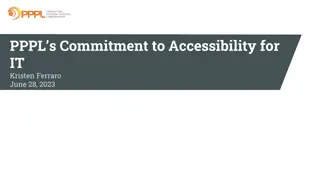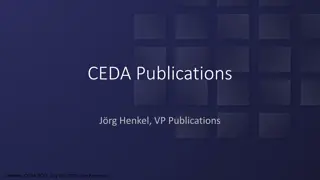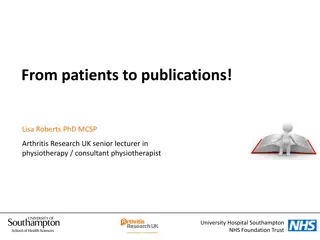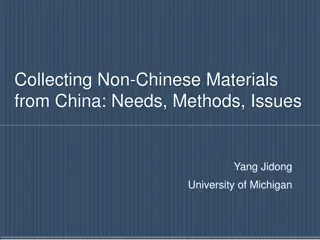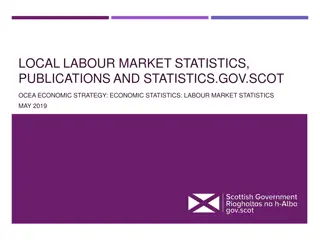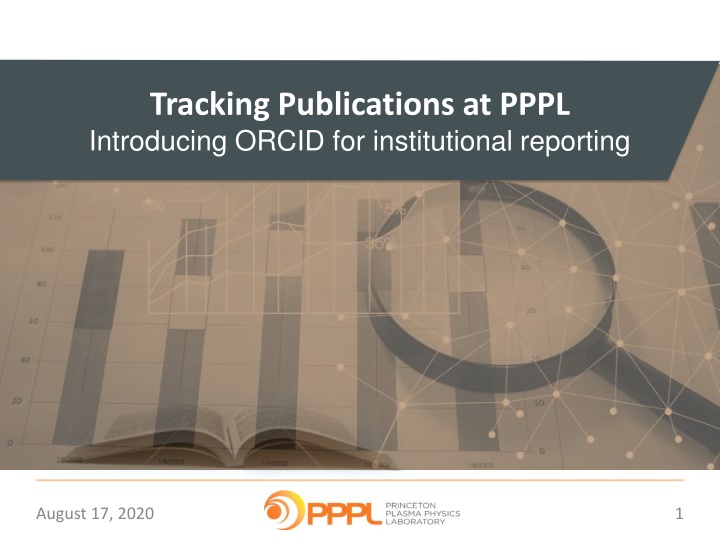
Implementing ORCID for Institutional Reporting Challenges at PPPL
Learn how the Princeton Plasma Physics Laboratory (PPPL) is addressing institutional reporting challenges by implementing ORCID, a unique digital identifier for researchers. Explore the tools and strategies used to improve data collection processes, tracking research products, and ensuring accurate attribution of funding and sponsorship.
Download Presentation

Please find below an Image/Link to download the presentation.
The content on the website is provided AS IS for your information and personal use only. It may not be sold, licensed, or shared on other websites without obtaining consent from the author. If you encounter any issues during the download, it is possible that the publisher has removed the file from their server.
You are allowed to download the files provided on this website for personal or commercial use, subject to the condition that they are used lawfully. All files are the property of their respective owners.
The content on the website is provided AS IS for your information and personal use only. It may not be sold, licensed, or shared on other websites without obtaining consent from the author.
E N D
Presentation Transcript
Tracking Publications at PPPL Introducing ORCID for institutional reporting August 17, 2020 1
Presentation Sections 1. Project Contacts 2. Institutional Reporting Challenges 3. DOE ORCID Consortium 4. PPPL/Princeton University Data Management Working Group 5. Implementing ORCID at PPPL 6. Identifying Trusted Users August 17, 2020 2
Project Contacts Aileen Pritch for all things Publications & Data Management (Call me, text me, email me I m here to help!) Anya Bartelmann Henry Munoz Library Services, Access to Research and Resources, Research Consultations ORCID Profile Trusted User August 17, 2020 3
Institutional Reporting Challenges Need: Tools to improve the accuracy, timeliness, and automation of data collection processes for reporting and promoting PPPL research products Identified processes: Collection of research product data for PEMP and DOE data calls Manual discovery and entry of Publications KPI metadata Formatting attribution/inconsistencies in promotion processes Linking publications to supporting research data Accurate and consistent attribution of funding/sponsorship User facility publications and proposal tracking August 17, 2020 4
Institutional Reporting Challenges How do OTHER labs address these process challenges? Collection of research product data for PEMP and DOE data calls How do these labs and research institutions integrate these processes with publication data and collection tools? - Integrated Publications reporting system, managed by centralized department Manual discovery and entry of Publications KPI metadata Many use ORCID. - Publications reporting system is primary source for dashboards and reports Formatting attribution/inconsistencies in promotion processes - Profile and institutional CV tools are available Linking publications to supporting research data - Integrated Publications reporting system links associated files Accurate and consistent attribution of funding/sponsorship - Integrated Publications reporting system informs other systems User facility publications and proposal tracking - Data and systems begin and end with forms, integrated with other business processes August 17, 2020 5
DOE ORCID Consortium ORCID provides a persistent digital identifier (an ORCID ID) that distinguishes you from every other researcher and ensures that your work is recognized by linking all professional research activities affiliations, grants, publications, peer review, awards, etc. ORCID ID is: A persistent digital identifier Universal, tied to you and not your institution/database Widely used by publishers, funders, and research institutions A tool to reduce risk of errors and save time Benefits: Easy to create and use Trusted user delegates and automatic updates available Ensure credit for your research publications, grant applications, and more August 17, 2020 6
DOE ORCID Consortium ORCID provides a persistent digital identifier (an ORCID ID) that distinguishes you from every other researcher and ensures that your work is recognized by linking all professional research activities affiliations, grants, publications, peer review, awards, etc. ORCID ID is: A persistent digital identifier Universal, tied to you and not your institution/database Widely used by publishers, funders, and research institutions A tool to reduce risk of errors and save time Henry will introduce a test case at PPPL in later slides Benefits: Easy to create and use Trusted user delegates and automatic updates available Ensure credit for your research publications, grant applications, and more August 17, 2020 7
DOE ORCID Consortium As of April 1, 2020, DOE now hosts a federal ORCID consortium membership. DOE-affiliated organizations (nat l labs, user facilities, libraries, etc.) are now members, using, collecting, and integrating individual ORCID iDs and ORCID API services to track research outputs and awards, determine the impact of user facilities, and evaluate the outcomes of outreach efforts. This month, PPPL has submitted a requisition and is in the process of approving an MOU to become the 6th member of this consortium, giving PPPL an institutional membership to ORCID. Access to this membership and its services are anticipated for the beginning of FY 2021. August 17, 2020 8
DOE ORCID Consortium What does an institutional membership offer PPPL? 5 API keys (integration with systems); administrative support to consortium members; assistance with planning ORCID integrations; centralized technical support contact to all members; and consortium documentation and technical documentation repositories. Community of Practice In addition to the premium membership features, the US Government ORCID Consortium establishes a Community of Practice: Open to all Consortium members Designed to share best practices, use cases, challenges, integration ideas Opportunities for cross facility/office collaborations, multi-program efforts Offers benchmarking to Consortium members. ORCID/DOE webinars and workshops August 17, 2020 9
DOE ORCID Consortium This Community of Practice will allow PPPL to review success stories of ORCID implementation at other labs. Below are some examples of systems/programs being implemented at Argonne and PNNL: Tracking collaborators and User Facility access Equipment tracking at User Facilities Publications submissions to OSTI for Public Access compliance Institutional reporting for PEMP PeopleSoft registration of new users/employees Implementing a universal proposal system for single- and multi-lab User Facilities Performance/promotion management awards and recognition Managing attribution of funding support for diverse research portfolios August 17, 2020 10
PPPL/Princeton University Data Management Working Group To tackle data management challenges and investigate ORCID system improvements, PPPL has partnered with Princeton University Data Services and Princeton University Libraries. This working group: proposes methods to automate and integrate processes for more efficient reporting, and guides sub-groups in the development of service and training programs for enhanced researcher support. Sub-groups will be focused on the following initiatives: 1) ORCID integration strategies for advanced institutional reporting and researcher CV management 2) Updating PPPL s Data Management Plan, training materials, and programs for researchers for better alignment with University best practices 3) Technical improvements to publications and data management repository functions for ease and more efficient delivery of services August 17, 2020 11
PPPL/Princeton University Data Management Working Group To tackle data management challenges and investigate ORCID system improvements, PPPL has partnered with Princeton University Data Services and Princeton University Libraries. This working group: proposes methods to automate and integrate processes for more efficient reporting, and guides sub-groups in the development of service and training programs for enhanced researcher support. Sub-groups will be focused on the following initiatives: 1) ORCID integration strategies for advanced institutional reporting and researcher CV management 2) Updating PPPL s Data Management Plan, training materials, and programs for researchers for better alignment with University best practices 3) Technical improvements to publications and data management repository functions for ease and more efficient delivery of services August 17, 2020 12
Implementing ORCID at PPPL Identify processes for improvement via APIs Complete all departmental presentations March CY21 Aug 20 Sept 20 Dec 20 Oct 20 Nov 20 Schedule departmental presentations Become DOE consortium member Test upgraded functions and workflows/ Deploy working group for analysis And then? PPPL will need all PPPL researchers to commit to creating research profiles to pursue these integrated processes for true automation of data. August 17, 2020 13
Identifying Trusted Users How do I create a profile? Where do I start? PPPL Trusted Users Program a train-the-trainer model Trusted Users can: Set up automated reporting from databases Clean publications lists for duplicates and metadata errors Compile consistent data call responses Assist with CV management for promotion, grant applications Provide one-on-one assistance when needed August 17, 2020 14
Identifying Trusted Users A successful test case: Raffi Nazikian = author; Henry Munoz = Trusted User August 17, 2020 15
Identifying Trusted Users August 17, 2020 16
Questions? Aileen Pritch Manager, Requirements & Publications O: 609-243-2245 C: 848-203-4005 apritch@pppl.gov Anya Bartelmann Astrophysics, Mathematics, Physics and Plasma Physics Librarian O: 609-258-3150 abartelm@princeton.edu Henry Munoz Assistant to ITER & Tokamaks Department O: 609-243-3258 C: 570-994-5533 hmunoz@pppl.gov August 17, 2020 17

